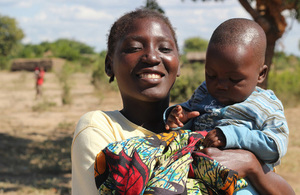New UK aid to provide sexual and reproductive health services for more than 300,000 Malawians
World Child Cancer has received UK Aid Match support, meaning for every £1 donated to them by the British public, £1 has been matched by the UK government through DFID.

- Country:
- United Kingdom
Thousands of more women in Malawi will benefit from family planning services through new support announced by Minister for Africa Harriett Baldwin today.
During a visit to the Scotland Malawi Partnership in Edinburgh, Ms. Baldwin set out how the six-year programme, called Tsogolo Langa which translates as ‘My Future’, will provide important sexual and reproductive health services for more than 300,000 Malawians and avoid an estimated 6,000 preventable maternal deaths.
Ahead of the visit, Ms. Baldwin said: "Every woman has a right to a happy and healthy life. This is about empowering women to take control of their own health and their own futures.
Malawi’s long-term success matters to the UK. That is why I am proud UK aid is supporting these vital services for hundreds of thousands of young Malawians, allowing them to make decisions on their families and futures in a safe and informed way. "
UK aid will provide access to modern contraceptives, help clinics from running out of stock and provide accurate health information for women in harder to reach rural areas. It will also work with young people to reduce teenage pregnancies and prevent unwanted pregnancies.
The Department for International Development (DFID) will work with the Government of Malawi’s Ministry of Health to deliver the programme, supporting the country’s aim to reduce its high teenage pregnancy rate.
Minister of Health and Population for the Government of Malawi, Atupele Muluzi said: "This assistance is very timely as Malawi continues to further stabilize its population growth that is driven by teenage pregnancy, currently standing at 29%.
Malawi still has a huge gap in providing different choices in contraceptives and this investment will assist in helping young women have more control of their future. Malawi appreciates the support that it receives from the UK Government, as our oldest and largest partner in our development."
DFID’s family planning support in the world’s poorest countries is helping women finish their education, get better jobs, fulfill their potential and in turn provide for their smaller planned families.
This latest support comes after Ms. Baldwin’s visit to Malawi last month during which she announced £37.5 million of new UK aid funding to support early grade learning and keep more girls in school. Ms. Baldwin also visited Majete National Park to see how the UK is supporting efforts to tackle the illegal wildlife trade.
Chief Executive of the Scotland Malawi Partnership, David Hope-Jones said: "We are delighted to meet Minister Baldwin and discuss the scale and impact of the people-to-people and nation-to-nation friendship Scotland enjoys with Malawi.
We welcome these new DFID funding commitments which will have a significant positive impact in Malawi."
While in Edinburgh, Ms. Baldwin also visited the Royal Hospital for Sick Children where she met with the Chief Executive of World Child Cancer Jon Rosser, and Dr. Emma Johnson, a pediatric oncologist who has volunteered with World Child Cancer for eight years.
World Child Cancer works to treat children suffering from cancer in developing countries by twinning hospitals with those in richer countries to support training and improve the quality of care available to children with cancer, regardless of where they are born.
Over the last year, World Child Cancer has received UK Aid Match support, meaning for every £1 donated to them by the British public, £1 has been matched by the UK government through DFID.










